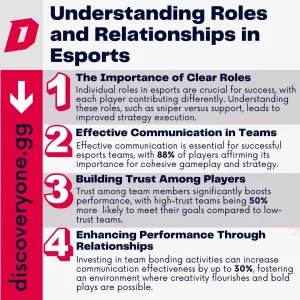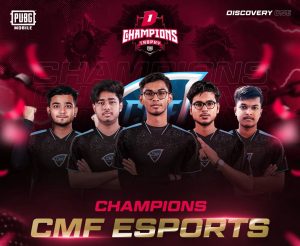In the rapidly evolving world of esports, assembling a high-performing gaming team can be the key to success. Understanding team-building dynamics becomes crucial for aspiring gamers and team managers as the competitive landscape intensifies. This blog will explore the essential components of creating a winning gaming team, from player selection to fostering team culture.
Understanding the Foundations of Team Dynamics
Successful esports teams are built on a foundation of strong team dynamics. This section will cover how roles and relationships among players can affect gameplay, collaboration, and overall team performance.

Understanding individual roles is at the core of every esports success story. Players must not only recognize their responsibilities but also appreciate the functions of their teammates. For instance, consider a first-person shooter team. The role of the sniper is fundamentally different from that of a support player. By understanding these distinct contributions, players can communicate more effectively during critical moments, leading to more cohesive gameplay.
Moreover, relationships between team members play a significant role in team dynamics. Trust and mutual respect cannot be overstated. When players believe in each other’s abilities, it elevates their performance. This fosters an environment where creativity flows, as players feel emboldened to make bold moves, knowing their teammates will have their backs. Hence, investing in relationship-building activities, such as team outings or casual play sessions, can yield immense dividends.
Strong team dynamics stem from clearly defined roles and robust interpersonal relationships. Gaming teams prioritize these elements to set the stage for a successful competitive journey.
The Importance of Player Compatibility
Selecting the right players for your gaming team goes beyond their individual skills. This section delves into how personality matches, play styles, and communication affect team unity and success.
When putting together a gaming team, the unity between players can often outweigh their individual talents. Imagine a team of highly skilled players who cannot communicate effectively; their potential may never be fully realized. It’s vital to look for players who excel in their roles and share compatible personalities. A hyper-competitive player may clash with a more laid-back teammate, leading to friction that hampers performance.
Equally important is the understanding of play styles. A player who thrives on aggression might struggle to work alongside a teammate who prefers a more cautious approach. Therefore, ensuring players complement each other’s styles can produce more fluid gameplay. Implementing personality assessments during player selection can help identify these compatibilities early on, making it easier to assemble a cohesive unit.
Compatibility is the undercurrent that can propel a gaming team forward or drag it into disarray. Being intentional about player selection based on character alignment and play styles is crucial for enhancing team performance.
Training Rules: Crafting the Perfect Practice Routine
Establishing a rigorous and effective training regimen is crucial once the team is formed. This part of the blog will explore various training techniques and how to maintain motivation among team members.
A well-structured training routine is the backbone of a successful esports team. This means considering various factors, including skill drills, scrimmages, and downtime. The most effective regimens balance intense practice with opportunities for reflection and improvement. A common pitfall is to push players excessively during training, leading to burnout. Instead, integrating recovery days and lighter sessions ensures players remain engaged and inspired.
In addition, employing various training techniques can keep practice fresh and exciting. Incorporating drills that focus on communication, strategy, and individual skills will diversify the learning experience and enhance overall team cohesion. A creative approach to training can include role-playing scenarios to simulate high-pressure situations. Not only does this sharpen skills, but this builds confidence in the players during actual matches.
Lastly but certainly not least, no matter how little, acknowledging and rewarding progress is huge in keeping a team motivated. It could be as simple as celebrating a strategy that worked well or rewarding higher individual performances. Recognition that you do not alone deal with everything creates an environment conducive to growth, thus building motivation from within to keep striving for excellence.
In essence, crafting the perfect practice routine combines effective techniques, opportunities for reflection, and a healthy dose of encouragement. This foundational aspect of team formation ensures players grow while bonding, which is essential for achieving esports excellence.
Building a Winning Mindset: The Psychological Aspect
Mental fortitude can often be the differentiator between winning and losing. This section discusses how to cultivate a positive mindset within the team, manage stress, and enhance performance under pressure.
In the high-stakes world of esports, the psychological aspect of gameplay is paramount. Building a winning mindset within your team can often dictate the outcome of pivotal matches. Consider the importance of resilience. Teams that can bounce back from setbacks usually emerge more substantial and united. Implementing regular discussions about mental health and coping strategies can equip players to handle stress better when the competition heats up.
Moreover, mindfulness techniques, such as visualization and breathing exercises, can help improve focus and reduce anxiety during critical moments in the game. Practicing these techniques regularly can significantly improve player performance, allowing them to stay calm under pressure. Creating a culture that embraces mental exercise alongside physical skill training will elevate your team’s competitive edge.
Ultimately, nurturing a winning mindset is an ongoing journey that requires dedication from both management and players. Establishing a foundation of psychological resilience through support and structured mental training can be the key to unlocking your team’s full potential.
The Role of Communication in Team Success
Effective communication is key in esports teamwork. This segment will address strategies for open dialogue, in-game communication, and conflict resolution that help maintain a cohesive unit.
Communication serves as the backbone of any successful gaming team. It begins with establishing clear expectations and guidelines for dialogue. Encouraging team members to express themselves openly fosters trust where players feel free to share ideas and concerns without fear of judgment. This proactive approach builds camaraderie and enhances strategic discussions during critical match preparations.
In-game communication takes on its form entirely. Players must develop shorthand and signals that enable quick, effective exchanges during fast-paced matches. Streamlining how calls-to-action are conveyed is essential; the less time spent communicating during a game, the more time players have to execute strategies. Regular practice sessions should emphasize these in-game communication techniques, refining the team’s real-time ability to adapt and react.
Conflict is inevitable in any team setting, and esports are no exception. Having a structured approach to conflict resolution is vital for maintaining team harmony. Encourage players to address issues directly and empathically, focusing on the problem rather than personal feelings. This culture of resolution can turn potential disruptions into learning opportunities, further solidifying the bond between teammates.
In summary, communication is the lifeblood of a functioning esports team. Emphasizing open conversations, fine-tuning in-game dialogue, and skillfully navigating conflicts allows teams to thrive in the ever-competitive esports landscape.
Adapting to the Ever-Changing Esports Environment
Esports is a fast-paced industry with constant shifts in gameplay strategies and meta. This section highlights the importance of being adaptable as a team and how to stay ahead of the competition.
The esports arena is characterized by its dynamic nature, where new strategies and updates frequently alter the competitive landscape. Maintaining adaptability within your gaming team is essential for staying competitive. An adaptable team not only welcomes change but also thrives under it. Establishing a culture of ongoing learning can do wonders—implementing regular strategy sessions where team members analyze trends and adjust tactics is pivotal.
Moreover, adaptability means embracing new technologies and innovations that continually shape how we approach games. Utilizing analytic tools to dissect past performances can provide invaluable insights into areas ripe for improvement. Teams that stay ahead of the curve are better positioned to seize opportunities opponents may overlook. Keeping an eye on shifts in community sentiment and emerging gameplay styles can serve as a litmus test for incoming changes.
The ability to adapt distinguishes great teams from merely good ones in the esports ecosystem. By fostering an environment of continuous learning and evolution, gaming teams can effectively navigate the challenges of a rapidly changing industry.
Wrapping Up Your Esports Journey
In conclusion, fostering a winning gaming team in esports is a multifaceted challenge requiring careful planning, strategic player selection, and continuous development of skills and team dynamics. By prioritizing teamwork, communication, and adaptability, gaming teams can enhance their performance and create a supportive environment that nurtures individual growth and collective success.






